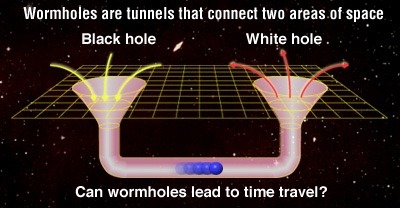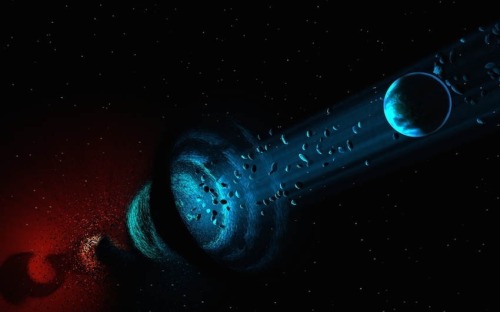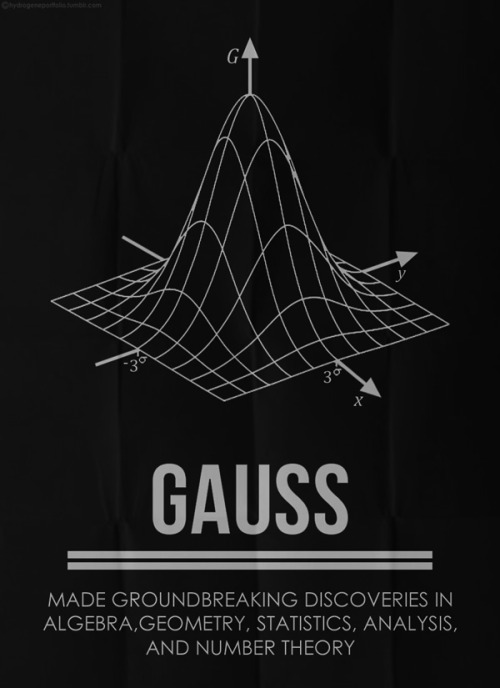Wormholes




Wormholes
Also known as Einstein-Rosen Bridges are theoretically possible going by Einstein’s theory, and equations of general relativity. Basically wormholes take advantage of our 3 dimensional space and are able to “bend” it. Picture a sheet of paper; now put two circular holes on each end of that sheet of paper. Normally the quickest way to join one point to the other would be to draw a straight line between them. Now instead, you could fold the piece of paper so each hole is touching meaning that there is no longer any distance between them. This is an analogy of how a wormhole works except instead of a circular hole on a 2D plane, the entry and exit points of an Einstein-Rosen bridge can be visualised as spheres in a 3D space.
While the theory of general relativity allows the existence of wormholes, we have not yet found physical evidence. The first wormhole solution discovered was the Schwarzschild wormhole presented in the Schwarzschild metric describing an eternal black hole. However this is not stable enough and would collapse before anything could cross from one end to the other. Traversable wormholes could exist of there was a form of exotic matter with a negative energy to stabilise them.
The Casmir effect shows that quantum field theory allows the energy density in some space to be relatively lower than the ordinary vacuum of space. A lot of physicists (like Stephen Hawking) use this to argue that it is possible to stabilise a traversable wormhole. However there are no known natural processes that would cause a traversable wormhole to stabilise.
The quantum foam hypothesis can be used to suggest the spontaneous appearance of tiny black holes at the Planck scale. Stable versions of these tiny wormholes have been suggested as dark matter candidates. It is also possible that one of these wormholes opened into a previously empty space from another universe, held open by a cosmic string (1D string) with a negative mass then it could be inflated to a macroscopic size by cosmic inflation. Is it possible this happened at the start of the Big Bang?
More Posts from Sleepysneezeydopeydoc-blog and Others





Minimalist Posters of Great Mathematicians.

Unit circle.


Stenciling with atoms in 2-dimensional materials possible
The possibilities for the new field of two-dimensional, one-atomic-layer-thick materials, including but not limited to graphene, appear almost limitless. In new research, Penn State material scientists report two discoveries that will provide a simple and effective way to “stencil” high-quality 2D materials in precise locations and overcome a barrier to their use in next-generation electronics.
In 2004, the discovery of a way to isolate a single atomic layer of carbon – graphene – opened a new world of 2D materials with properties not necessarily found in the familiar 3D world. Among these materials are a large group of elements – transition metals – that fall in the middle of the periodic table. When atoms of certain transition metals, for instance molybdenum, are layered between two layers of atoms from the chalcogenide elements, such as sulfur or selenium, the result is a three-layer sandwich called a transition metal dichalcogenide. TMDs have created tremendous interest among materials scientists because of their potential for new types of electronics, optoelectronics and computation.
Read more.








All bets are off on what might be the next costume…

God damn it Isaac! 😡😡





Venus over Bioluminescent Algae

I can relate to three out of four of them 🙃

-
 oldanddilis reblogged this · 5 years ago
oldanddilis reblogged this · 5 years ago -
 oldanddilis reblogged this · 5 years ago
oldanddilis reblogged this · 5 years ago -
 kappa14 liked this · 6 years ago
kappa14 liked this · 6 years ago -
 kirby58-blog liked this · 6 years ago
kirby58-blog liked this · 6 years ago -
 illuminati-duh liked this · 7 years ago
illuminati-duh liked this · 7 years ago -
 galand20 liked this · 7 years ago
galand20 liked this · 7 years ago -
 marvi-jude94 liked this · 7 years ago
marvi-jude94 liked this · 7 years ago -
 m3mentomor1 reblogged this · 7 years ago
m3mentomor1 reblogged this · 7 years ago -
 symbioticsimplicity liked this · 7 years ago
symbioticsimplicity liked this · 7 years ago -
 jasminegokuko liked this · 7 years ago
jasminegokuko liked this · 7 years ago -
 eynrbrzm liked this · 7 years ago
eynrbrzm liked this · 7 years ago -
 white-trash-balling liked this · 7 years ago
white-trash-balling liked this · 7 years ago -
 sucio-1-blog liked this · 8 years ago
sucio-1-blog liked this · 8 years ago -
 my-so-called-euphoria liked this · 8 years ago
my-so-called-euphoria liked this · 8 years ago -
 sleepysneezeydopeydoc-blog reblogged this · 8 years ago
sleepysneezeydopeydoc-blog reblogged this · 8 years ago -
 sleepysneezeydopeydoc-blog reblogged this · 8 years ago
sleepysneezeydopeydoc-blog reblogged this · 8 years ago -
 sleepysneezeydopeydoc-blog liked this · 8 years ago
sleepysneezeydopeydoc-blog liked this · 8 years ago -
 drzaa liked this · 8 years ago
drzaa liked this · 8 years ago -
 triskyson liked this · 8 years ago
triskyson liked this · 8 years ago -
 echoing-oceans liked this · 8 years ago
echoing-oceans liked this · 8 years ago -
 spadeskeletalspade reblogged this · 8 years ago
spadeskeletalspade reblogged this · 8 years ago -
 freakqncy-blog reblogged this · 8 years ago
freakqncy-blog reblogged this · 8 years ago -
 licomming-blog liked this · 8 years ago
licomming-blog liked this · 8 years ago -
 freakqncy-blog liked this · 8 years ago
freakqncy-blog liked this · 8 years ago -
 todaysteaparty liked this · 8 years ago
todaysteaparty liked this · 8 years ago -
 tifflovespandas-blog liked this · 8 years ago
tifflovespandas-blog liked this · 8 years ago